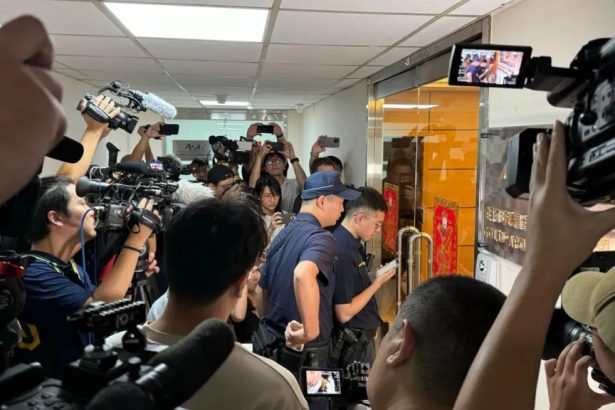Taiwan Pager Manufacturer : The investigation into the deadly explosions in Lebanon has taken an unexpected twist, pointing toward a Taiwanese pager company that had remained largely under the radar until today. At least 12 people lost their lives, and nearly 3,000 were injured in the explosions that targeted Hezbollah members on Tuesday, igniting geopolitical tensions across the Middle East.
Gold Apollo, a Taiwanese electronics firm specializing in pagers, was thrust into the spotlight after reports surfaced that the devices used in the attacks may have been linked to the company. However, Gold Apollo’s founder, Hsu Ching-Kuang, strongly refuted these allegations. Speaking to reporters outside the company’s headquarters in Taipei, Hsu insisted, “Those pagers do not have any mark saying ‘Made in Taiwan,’ and we did not manufacture them!”
Gold Apollo operates from a non-descript business park in a suburb of Taipei, a hub for small to medium-sized manufacturers that form the backbone of Taiwan’s economy. The firm’s office, adorned with posters showcasing various pager models, now faces scrutiny from Taiwanese authorities, with a team of investigators seizing documents as part of their inquiry.
Denials and Suspicious Deals
Hsu pointed to another company, Hungary-based BAC Consulting, as the maker of the pagers used in the Lebanon attacks. According to Hsu, Gold Apollo had signed a licensing agreement with BAC Consulting three years ago, allowing BAC to use the Gold Apollo brand name. However, Hsu revealed that there had been “strange” financial dealings with BAC, including payment issues that involved transfers through the Middle East. He stopped short of elaborating on these suspicious transactions.
Originally, BAC Consulting had approached Gold Apollo with a plan to sell the company’s pagers in Europe. After a year, BAC proposed making their own pagers under the licensed Gold Apollo brand. “We only provided brand trademark authorization and had no involvement in the design or manufacturing of these products,” Gold Apollo stated in an official release.
Despite the company’s assurances, the presence of investigators and confiscated evidence suggests that Taiwanese authorities are still probing deeper into the matter.
Taiwan’s Manufacturing Web and Outsourcing
Hsu’s claim that Gold Apollo did not manufacture the controversial pagers is plausible, considering Taiwan’s complex manufacturing ecosystem. Many Taiwanese companies, including Gold Apollo, often license their brand names or outsource production to manufacturers in China or Southeast Asia. These small firms may own the brand name, research, and design capabilities but rely on external factories for mass production.
In this case, Gold Apollo may have simply been a link in a global chain of outsourcing. Pagers, once a technological marvel in the 1980s and 1990s, are relatively simple devices. Even today, many manufacturers around the world are capable of producing them. These radio receivers display short text messages and were once widely used by businesses before the advent of mobile phones.
However, Gold Apollo has moved away from pager production in recent years, focusing instead on short-range radio devices, particularly for restaurants. Their most successful product today is a disc used in food courts that lights up and vibrates to notify customers when their order is ready.
The BAC Consulting Mystery
While Gold Apollo denies responsibility, the spotlight now shifts to BAC Consulting. BBC attempts to reach BAC for comment have so far been unsuccessful, and little is known about the company or its leadership.
The unanswered questions surrounding the origin of the pagers used in the Lebanon attacks remain: if Gold Apollo didn’t make the devices, who did, and how did they end up in Hezbollah’s hands?
For now, Gold Apollo continues to distance itself from the tragedy, but this extraordinary case highlights the complexities of global manufacturing and licensing, leaving many details unresolved.
By shedding light on the intricate web of international manufacturing and licensing, this story underscores how a small Taiwanese firm found itself at the center of a global controversy.


